What Are Peptides?
Often referred to as the “building blocks of life,” peptides are an intriguing family of molecules that are essential to both the human body and many scientific fields. Peptides are just short sequences of amino acids, which are what makeup proteins. These molecular wonders, which generally include 2 to 50 amino acids, are recognized for having a wide range of activities and being incredibly adaptable.
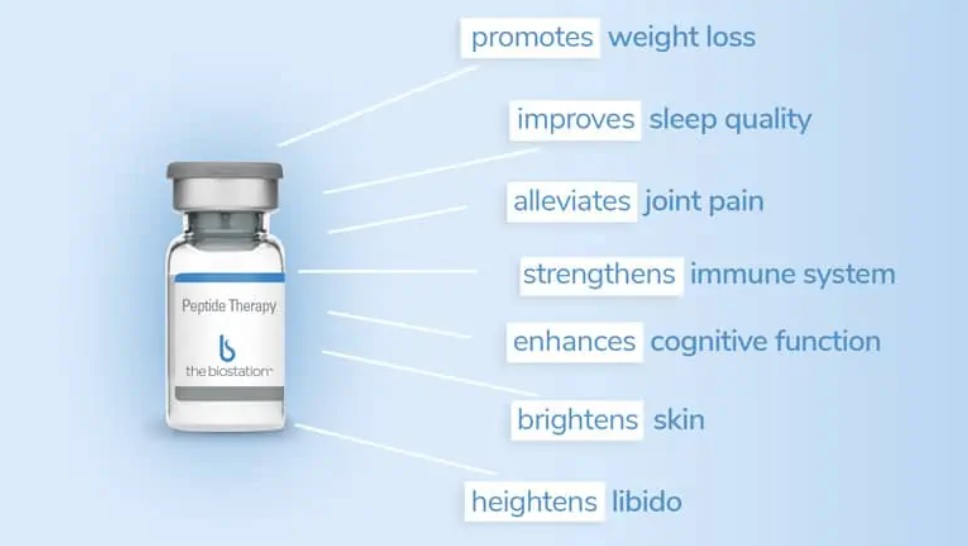
The Structure and Function
- A peptide is made up of amino acids that are joined together by peptide bonds.
- Amino acids are chemical molecules with a core carbon atom that is connected to four important components: a hydrogen atom, an amino group (NH2), a carboxyl group (COOH), and a distinct side chain (R group).
- The sequencing of these side chains is what separates one amino acid from another and gives the ensuing peptide-specific characteristics.
- Peptides are created in the cells of living creatures through a process known as protein biosynthesis.
- This complex process involves the transcription of DNA into messenger RNA (mRNA), followed by the translation of mRNA into a sequence of amino acids, which eventually forms the peptide chain.
- Numerous essential biological functions are designed by peptides at the molecular level.
- They act as messengers, transferring important data between and within cells. Some peptides work as hormones, controlling a range of physiological processes like growth, metabolism, and reproduction.
- For instance, the well-known peptide hormone insulin controls blood sugar levels, whereas growth hormone (GH) controls development and growth.
- Peptides also support the body’s defense mechanisms. By thwarting dangerous infections, antimicrobial peptides like defensins contribute significantly to the innate immune system.
- Neurotransmitters, such as endorphins and serotonin, let nerve cells communicate with one another and affect mood and behaviour.
The Surge of Peptides in Healthcare
- Due to outstanding developments in molecular biology and biotechnology, which have unlocked the potential of peptides as therapeutic agents, peptide treatment has become more popular in healthcare.
- Peptide treatment has wonderfully complemented the emergence of personalized medicine.
- Peptides may be customized to a person’s genetic profile and particular medical needs, meeting the rising need for patient-specific treatment methods.
- The potential of peptide therapy to deliver tailored treatment with minimal side effects has been a major factor in its rise. Peptides are made to bind specifically with certain molecules or receptors, which minimizes side effects that are frequently linked with conventional drugs.
- Peptide treatment has a wide range of possible uses, from treating hormone imbalances and chronic pain to improving cognitive function and increasing skin health.
- Healthcare professionals looking for practical answers to a range of health issues have taken note of this adaptability.
- As the number of peptide therapy clinical trials and research studies increases, success tales and promising results have surfaced, bolstering the therapy’s efficacy.
- Real-world outcomes have been crucial in establishing peptide therapy as a treatment that is reliable and efficient.
- Peptide treatment provides appealing answers in an era where people prioritize well-being, longevity, and keeping young vigor. Peptides that target anti-aging, weight loss, and fitness goals have grown increasingly popular among individuals trying to improve their health and appearance.
- The ease with which many peptides can be administered by less invasive procedures such as subcutaneous injections or oral supplements improves patient compliance and accessibility.
The Science Behind Peptide Therapy
- Peptides are small messengers that transport vital information between cells and tissues inside the body.
- They function similarly to text messages sent by your body’s communication system, offering specific instructions.
- Peptides interact with cell surface receptors. It’s similar to a lock and key system in that the correct peptide fits into the correct receptor, eliciting a specific reaction.
- Peptide hormones are peptides that assist control of key body activities. Consider them to be the conductors of your body’s symphony.
- For example, insulin, a well-known peptide hormone, regulates your blood sugar levels to ensure they are optimal.
- Neuropeptides communicate between nerve cells. They are in charge of signal transmission in your brain and throughout your neurological system.
- These messages have an impact on your mood, behaviour, and cognition.
- Antimicrobial peptides act as a security detail for your body. They aid in the defense against dangerous germs such as bacteria and viruses.
- They are part of your innate immune system, ready to defend you at any time.
- Peptides, such as growth hormone-releasing peptides (GHRPs), increase the generation of growth hormone (GH).
- GH acts as your body’s construction manager, supervising cell repair and growth, which is necessary for healing and muscular development.
- Certain peptides have anti-inflammatory characteristics, which means they help decrease inflammation, which is typically the source of pain.
- Peptides can also serve as antioxidants, neutralizing dangerous chemicals known as free radicals that can injure your cells.
- Peptides have acquired an important role in the cosmetic industry due to their ability to increase collagen formation.
- Collagen peptides increase the suppleness and moisture of your skin, which helps to eliminate wrinkles and keep your skin looking young.
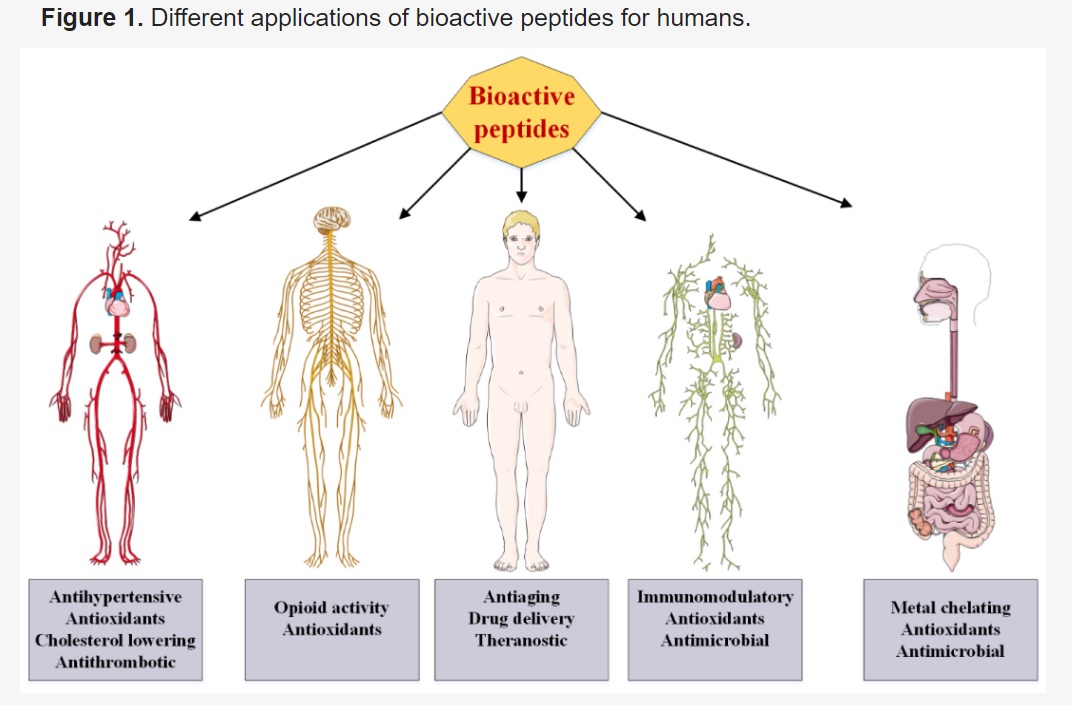
Administration
- There are several peptides, each with its unique ability. Some aid in weight loss, while others ease discomfort and improve cognitive function.
- Melanotan II, for example, aids in appetite management and tanning, whilst Thymosin Alpha-1 boosts your immune system.
- Peptide treatment frequently entails subcutaneous injections that release peptides straight into your circulation for immediate action.
- Some peptides are available as oral supplements or lotions, however, their usefulness may be limited due to digestive or epidermal barriers.
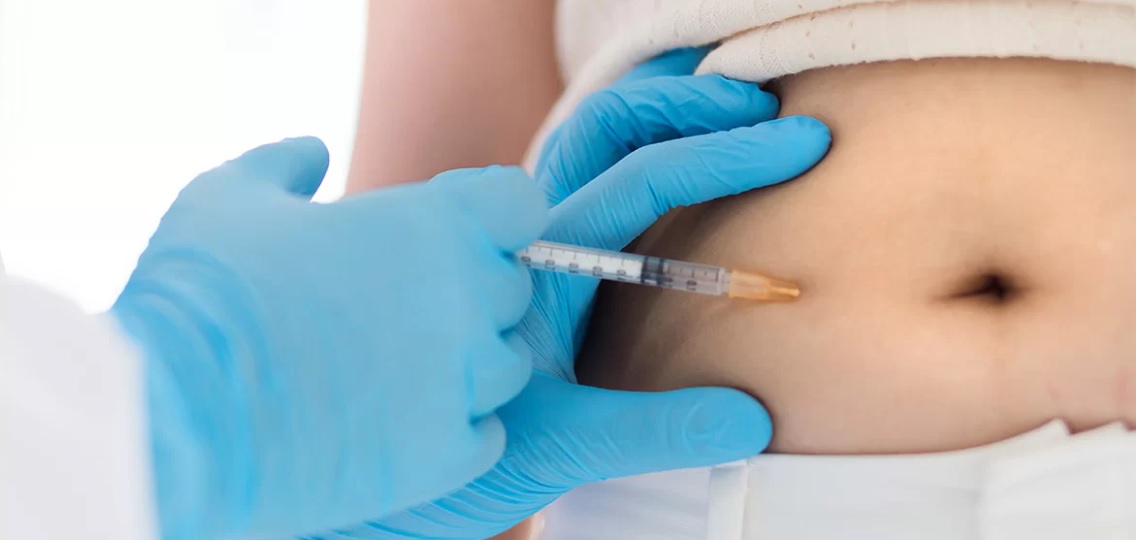
Health Benefits of Peptide Therapy
- Weight Management and Muscle Gain:
- Peptides like GHRPs encourage your body to release growth hormone, which helps you build lean muscle and burn fat.
- They’re like the personal trainers of your body, making it easier to stay fit.
- Anti-Aging and Skin Health:
- Certain peptides, such as copper peptides and GHK-Cu, have a knack for making your skin look youthful.
- They’re like magic potions for your skin, boosting collagen to reduce wrinkles and maintain a fresh appearance.
- Accelerated Wound Healing and Joint Rehabilitation:
- Peptide therapy speeds up the body’s natural healing process.
- Think of peptides as your body’s repair crew, helping to mend wounds and recover from joint injuries faster.
- Enhancing Overall Health and Immunity:
- Immune-boosting peptides, like Sermorelin and CJC 1295/Ipamorelin, help your immune system stay strong
- They act as your body’s shield, defending against illness and ensuring you stay healthy.
- Cognitive Function and Memory Enhancement:
- Peptides like Noopept and Cerebrolysin are like brain trainers.
- They help sharpen your memory, improve focus, and keep your brain in top shape.
- Chronic Pain and Inflammation:
- Some peptides, including LL-37 and VIP, work as natural pain relievers.
- They’re like soothing balms for your body, calming inflammation and reducing chronic pain.
- Cardiovascular Health and Blood Pressure Regulation:
- Certain peptides, like BNP, play a role in heart health.
- They’re like guardians of your cardiovascular system, helping to keep your blood pressure in check and your heart strong.
- Peptides for Autoimmune and Inflammatory Disorders:
- Peptides such as low-dose naltrexone (LDN) and thymosin alpha-1 are like peacekeepers in your body.
- They help regulate your immune system and can provide relief for conditions like rheumatoid arthritis.
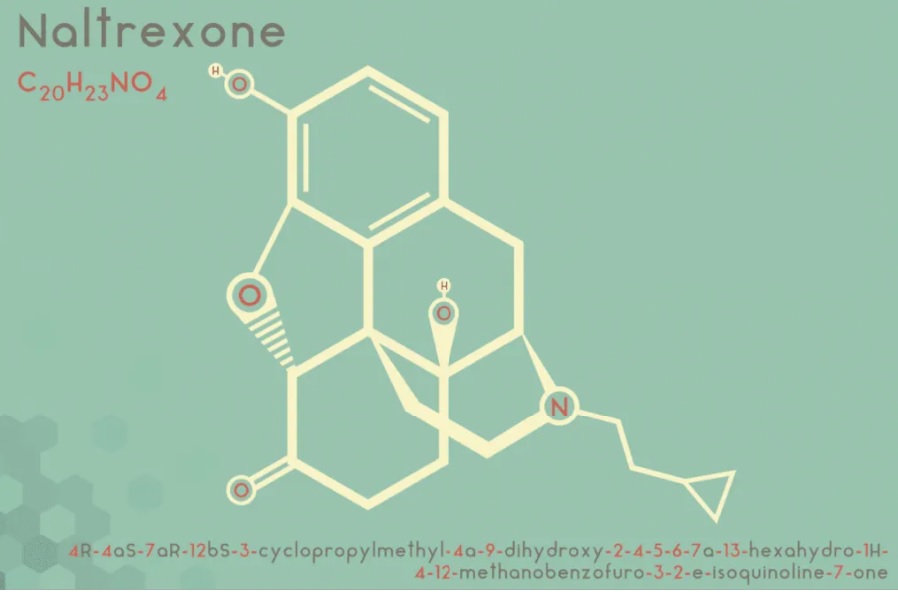
- Peptides for Neurological Disorders:
- Peptides like Semax and Selank are like brain therapists.
- They may help slow down the progression of neurological disorders, such as Alzheimer’s and Parkinson’s disease, and improve brain function
- Peptides for Skin:
- Peptides like Matrixyl are beauty secret weapons.
- They’re like superheroes for your skin, hydrating it and reducing fine lines for a radiant complexion.
Is Peptide Therapy Safe?
- Clinical Supervision:
- Clinical supervision is an important safety factor in peptide treatment. Peptide therapy should always be provided under the supervision of a skilled healthcare professional with peptide treatment experience.
- This ensures accurate dosage, monitoring, and control of any adverse effects.
- Peptide Selection:
- Choosing the right peptide is critical. Not every peptide is appropriate for every person or situation.
- Your healthcare professional will choose the best peptide for you based on your health objectives, medical history, and specific requirements.
- Administration:
- Dosage accuracy is critical for safety and effectiveness.
- Peptides are extremely powerful, and even little changes in dose might result in diverse consequences.
- Your healthcare practitioner will establish the best dose for you based on your unique needs.
Common Safety Issues
- As with any medical therapy, allergic responses are possible.
- Specific peptides may cause symptoms such as hives, edema, or trouble breathing in some people.
- These responses, however, are quite uncommon and may be treated under medical care.
- Peptides are frequently provided through injection, which might result in minor adverse effects at the injection site.
- Pain, redness, swelling, and bruising are some of the symptoms. These responses are generally brief.
Peptide Therapy vs. Conventional Medicine
The combination of peptide treatment and conventional medicine has multiple benefits, resulting in a synergy that benefits patients in a variety of ways:
- Customized Care:
- Although conventional medicine frequently adheres to standardized treatment methods, each patient is unique.
- Peptide therapy enables personalized treatment programes that meet specific health goals and medical issues.
- Focused Healing:
- Peptides are precise messengers that are designed to target certain receptors and biological processes.
- When taken in conjunction with conventional therapies, they can improve their efficacy by enhancing their intended activities.
- Improved Recovery Time:
- Peptide treatment has the potential to accelerate healing and recovery, making it an effective supplement to traditional medical procedures.
- Peptides, for example, can speed up tissue healing and minimize inflammation following surgery or injury.
- Fewer Adverse Effects:
- Conventional drugs can occasionally have negative side effects.
- Because of its tailored approach and utilization of naturally occurring peptides, peptide treatment is often linked with fewer adverse effects
- Immune Boost:
- Some peptides promote immune function, which can be especially advantageous for people receiving immuno-suppressing medicinal therapies.
- They aid the body’s ability to fight infections and recover more quickly.
- Holistic Health:
- Combining peptide treatment with traditional medicine improves general health.
- Peptides can help with a variety of health issues, from pain relief to cosmetic improvements, and they have a wide range of applications.
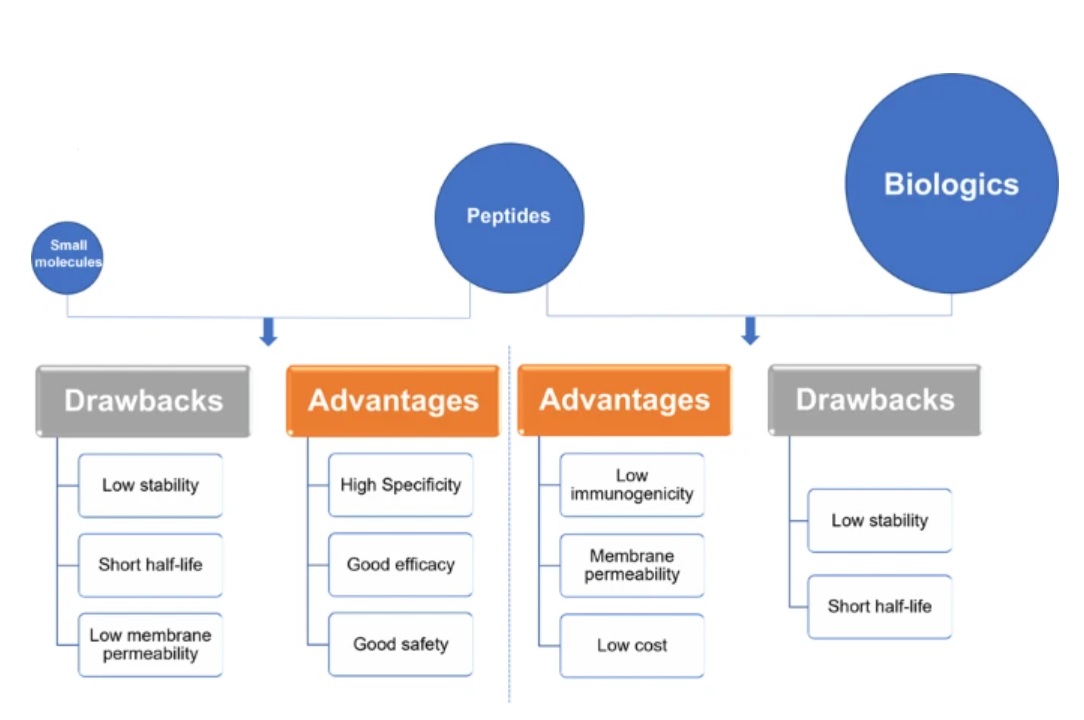
Peptide Therapy – Practical applications
Let’s look at some real-world examples of how combining peptide treatment with conventional medicine might assist patients:
- Surgery and Post-Operative Care:
- Peptides like BPC-157 can be given before surgery to improve tissue healing and minimize inflammation.
- Peptides can help with healing and rehabilitation after surgery, lowering discomfort and speeding up the return to normal activities.
- Chronic Pain Management:
- Analgesic peptides, such as LL-37, can supplement traditional pain management techniques.
- They may aid in the reduction of the need for opioid drugs, which carry the danger of addiction and negative effects.
- Immune Support During Cancer Treatment:
- Cancer therapies such as chemotherapy and radiation can have a negative impact on the immune system.
- Immune-stimulating peptides like Thymosin Alpha-1 may assist patients in tolerating therapy.
- Aesthetic and anti-aging medicine:
- GHK-Cu (Copper Peptide) peptides can improve skin health and minimize the effects of aging.
- The use of these peptides in dermatological therapies has the potential to improve results.
- Heart Health:
- In medicine, peptides such as B-type Natriuretic Peptide (BNP) are used to diagnose and treat heart failure.
- Peptide treatment can help improve heart function and reduce inflammation, which can help with cardiovascular health.
- Weight Loss and Metabolic Disorders:
- Peptides like Melanotan II (MT-II) can help with weight control, making them excellent supplements to healthcare-supervised weight loss programs.
- Autoimmune disorders:
- Immune-modulating peptides may help control symptoms and enhance the quality of life in individuals with autoimmune illnesses such as rheumatoid arthritis or multiple sclerosis in addition to traditional therapy.
FAQs About Peptide Therapy
How long do peptides last in your body?
The time it takes for a peptide test to identify drugs varies depending on the type of test, but it typically lasts around three months after usage.
Who should avoid taking peptides?
Those who are pregnant, nursing, on drugs, or have a medical problem should avoid utilizing peptides until they consult with their doctor.
Why can’t peptides be taken orally?
It is incredibly difficult to deliver proteins and peptides orally. The digestive tract is intended to break down polypeptides into amino acids before absorption. Drug bioavailability is still a hot topic in the scientific community.
How should peptides be stored?
Peptides should be kept in a cold, dry area. Store for maximum preservation.
Do peptides help people with stress and anxiety?
Many peptides have been linked to mood swings, hormonal health, and immunity. Hypocretin, a peptide, has been proven to increase mood in humans, which can help relieve stress and anxiety.









